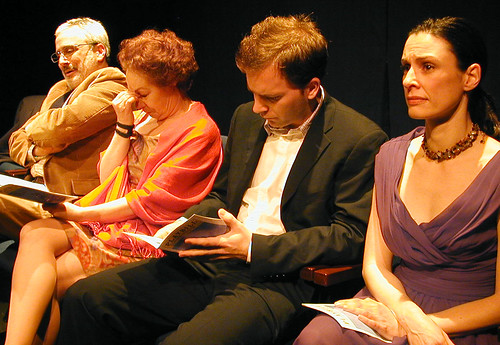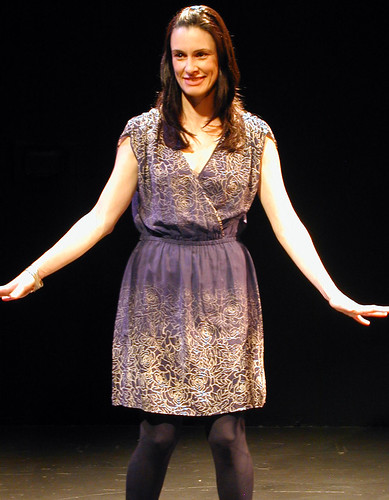Into the void with Will Eno; we do not move
Bathroom and beverage break: the cast of Will Eno's Intermission includes (from left) David Sinaiko, Gwyneth Richards, Galen Murphy-Hoffman and Danielle O'Hare. Below: O'Hare as the title character in Lady Grey (in ever lower light). Photos by Rob Melrose
Will Eno builds some extraordinary bridges – between absurdist theater of the 1950s and now, between laughs that actually tickle and reality that is actually harsh, between ironic dismissal and deep, deep feeling.
I would happily lose myself in Eno's world for days if possible – his combination of humor, desolation and intelligence come together in ways that make me incredibly happy. And incredibly sad. Thank whatever powers that be in the universe that Will Eno is writing for the theater and that he's seemingly unaffected by anything remotely hipster or sappy or commercial.
Cutting Ball Theatre produced Eno's Thom Pain (based on nothing) in 2009 to great acclaim. Happily, the Cutting Ball-Eno collaboration continues. Three theater-related one-acts are now running at the EXIT on Taylor, and they're every bit as engaging, hilarious and tinged with genius as Thom Pain.
Lady Grey (in ever lower light) contains two monologues and one multi-character play. They all confront the notion of theater as a "recreational" means to emotion, a gingerly step (as a group) into the maw of the abyss known as reality. We're all alone, yet we're all in it together.
"Let me guess – an audience, right? Or, wait, no – friends of the deceased? Family of the victim? Whoever you are, you're very convincing. White people in chairs? Cheer up. You're all very beautiful, in a very general way." Those words are spoken by Lady Grey, the star of the first (and title) play. She assesses us and we her. As played by Danielle O'Hare, she is sharp, melancholy and a little distracted.
"It doesn't work, my life, without people sitting there, staring, undressing me with their eyes, then undressing themselves, brushing their teeth in their minds and falling asleep, wishing they were dead. So, honestly, thank you," Lady Grey continues, breaking down the fourth wall and giving us a sort of context for her monologue. She acknowledges that we're all experiencing a piece of theater and the proceeds to tell us about the pains of life – childhood illness, show-and-tell day in school, lost love and the fear of oncoming night.
She sings a little and she jokes a lot. There are things she says that are outright hilarious and should bring down the house, but O'Hare's delivery (under the direction of Cutting Ball Artistic Director Rob Melrose) is so droll, so pained at times, that the laughs are tempered by lurking tragedy. It's a powerful purgatory to inhabit – reveling in the artificiality of the theatrical experience yet savoring every real, prickly emotion that floats from stage.
"You could compare me to a summer's day, though this really wouldn't be necessary," Lady Grey tells us. "I could be compared to a winter's night, too, though by whom, and why? I'm like last Saturday. Cold, cloudy, over. I can't be bothered." She pauses the way a comedian should pause. Then she adds, "I can be bothered, I lied."
The second piece, Intermission, is set just before and during intermission of a drama called The Mayor (the maudlin excerpt we hear is priceless). An older couple, David Sinaiko and Gwyneth Richards are sitting next to a younger couple, O'Hare and Galen Murphy-Hoffman. It's an Albee-like set-up milked for all its worth, the age and experience of the older couple trumping the somewhat youthful ignorance of the younger, all the while satirizing serious drama (and the theater companies that underscore its very serious importance).
At one point the older man admonishes the younger: "But, son, do you have a mother? Do you love anything old? Have you ever lost anything, slowly? And if not, then, what experience are you hoping to see represented here? You are comparing this to what?" The artificiality of the theater suddenly seems quite small, especially in the shadow of a story the older man tells about losing his dog, Emily, after she was injured.
"She was like a member of the family," the older woman adds.
"No, in fact, she was not like a member of the family," her husband rejoins. "My father was like a member of the family. I'm like a member of the family. She was The Dog. Always there, never moody, living better and truer through life than any of us, by at least a factor of seven. She gave us many beautiful people years."
In this funny little island of theatricality – the supposedly real space in between the fake parts – we get real drama, real feeling and the spectrum of life. We get a kinder, gentler Virginia Woolf in miniature with less booze. "This is very old-fashioned, somehow. All of us sitting here, having all these feelings, all lit up. It's nice," the older woman concludes. And so it is.
The final piece of this 85-minute evening (and that includes an actual 15-minute intermission between the first and second plays) is Mr. Theatre Comes Home Different, a showcase for Sinaiko to hurl scenery and mock the sturm und drang of the dramatic arts. He eats a flower, yearns (oh, how he yearns!) and hopes his fake emotions can somehow intersect with our own genuine emotions.
"Gentles all, my name is blank. And I have come and kicked things over. I have breathed badly. I will act quickly, entertain myself, and then leave," Mr. Theatre tells us. "This is my character, as I would have you have it; and this, my interior life, as I would, for you, outwardly live it." It's a whirlwind performance full of Shakespearean notes, signifying nothing (and everything), and it made me think of something Lady Grey said earlier, "The unreadiness is all."
Will Eno is his own particular kind of genius, and the showcase that is Lady Grey (in ever lower light) is just more evidence of that. To share the darkness with a Will Eno play is one of life's pleasures. It's as pretend and as real as it gets.
FOR MORE INFORMATION
Lady Grey (in ever lower light) continues through April 10 at EXIT on Taylor, 277 Taylor St., San Francisco. Tickets are $15-$30. Call 800-838-3006 or visit cuttingball.com for information.

